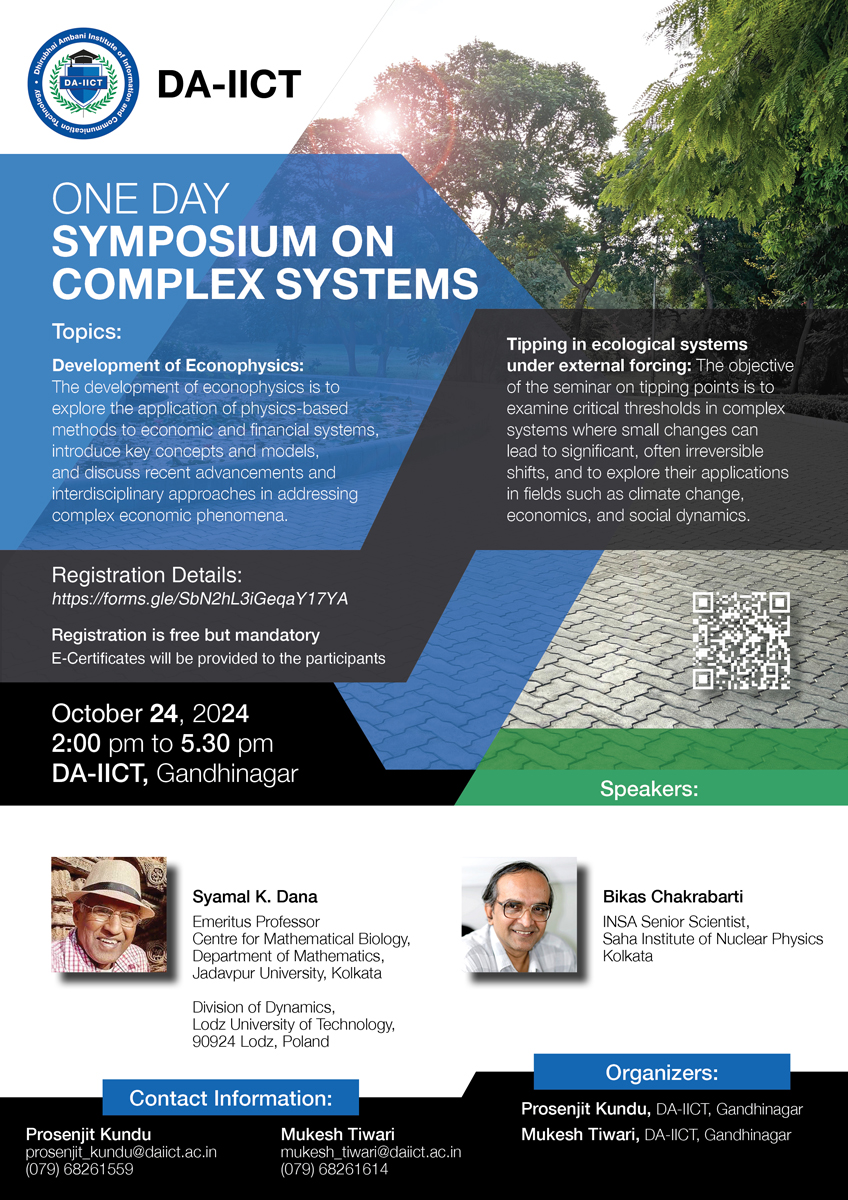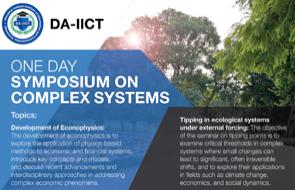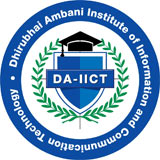Dhirubhai Ambani Institute of Information and Communication Technology, Gandhinagar
- PG Admissions 2023 Announced
- | Ph.D. Admissions 2023 Announced
- | Admission Helpline - Voice call: 080 66 91 91 80
- M.Tech. (EC) - last date 28th April 2022
- Admission Helpline - Voice call: 080 66 91 91 80
- UG Admissions - All India Category - Admission Status Announced
Events
One Day Symposium on Complex Systems
Venue: CEP Conference Room, DA-IICT, Gandhinagar, Gujarat
Date: 24 October 2024, 2:00 pm to 5.30 pm
For the registration form, click here
Registration is free but mandatory
E-Certificates will be provided to the participants
Talk 1:
Title: Development of Econophysics from India
Speaker:
Prof. Bikas Chakrabarti, INSA Senior Scientist,
Saha Institute of Nuclear Physics, Kolkata
Abstract : Econophysics is a relatively recent topic of research involving statistical physics and economics. Though such attempts have been more than a century old, regular discourses by physicists on some economics problems in the physics departments (and publishing their research results mostly in physics journals) have been new, and started specifically with the "historic conference in Kolkata in 1995" (R. Kutner, C. Schinckus & H. E. Stanley, Entropy, vol. 23 [2022] 254). The yearly rate of publications with the word "econophysics" in such papers has grown from zero in 1994 to about one thousand and five hundred in 2023 (one may note, not all the physics papers today on problems of economics necessarily mention 'econophysics'). Several models developed by Indians and their implications have become widely acclaimed. We will discuss some of these developments.
Talk 2:
Title: Tipping phenomena in Nature
Speaker:
Syamal Dana, Emeritus Professor
Centre for Mathematical Biology, Department of Mathematics, Jadavpur University, Kolkata
and
Visiting Professor, Division of Dynamics,
Lodz University of Technology, 90924 Lodz, Poland
Abstract : Tipping represents a phenomenon that makes a large transition from one stable state to another due to a small perturbation. It has been reported in nature, climate, ocean systems and ecology and even engineering systems. Examples of tipping elements that show up such transitions are many, EL-Nino, Atlantic meridian overturning circulation (AMOC), Indian monsoon and Greenland ice cap melting due to global warming, rainforest to mention a few. As an after effect, many undesirable large changes, closing of AMOC, outbreak or extinction of species, in the future have been expected. Studies on tipping started through rigorous mathematical approaches mainly in the last two decades using simple models. The studies involve simple non-autonomous (time dependent) dynamical models under external perturbations that differs from the time-independent autonomous dynamical framework. The mathematics itself is a challenging issue. Besides developing the mathematical framework of non-autonomous systems for appropriating the model studies, many numerical studies on such non-autonomous forced systems have revealed interesting tipping behaviours such as the bifurcation tipping, rate-induced tipping and noise induced tipping. Each of them shows specific characteristic features of tipping and their ultimate effect on the tipping element in several model systems. I will discuss, in brief, with examples, what is the meaning of tipping and how it appears in some natural systems. Finally, I will share our experience in ecological models how they respond to environmental variability leading to tipping.
One Day Symposium on Complex Systems (PDF)



